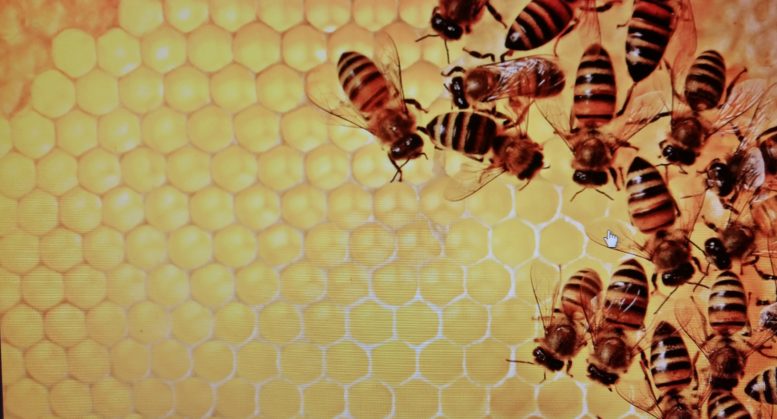By JAN LARSON McLAUGHLIN
BG Independent News
Few people probably know what an apiarist is. Fewer still know that Wood County has one on the payroll.
But this morning, the county commissioners hired a new apiarist – a beekeeper – to keep an eye on the honey bee hives in the county.
Why does the county need a beekeeper? Well it turns out that a lot of crops raised locally rely on honey bee pollination – like pumpkins, apples, tomatoes and strawberries.
The role was filled for years by Fritz Gehring, who retired earlier this year. The new apiarist is Michael Horst, who works in the heating and air conditioning business, but who has gardened for years.
“As a gardener, it led into that naturally,” Horst said of beekeeping. In fact, he was named Michael after his great-grandfather, who was a beekeeper. He not only inherited the name and the inclination, but also the 50-year-old beekeeping equipment.
Horst has already started his rounds in the county, visiting first some of the bee hives in the Perrysburg area and the Wood County Park District.
“It’s a lot of education for the newbies, and catching up with the older ones,” Horst said of the local beekeepers.
Horst has been inspecting for mites, which are the biggest problem plaguing honey bee hives right now. He also looks for bacterial diseases, which are spread to healthy hives by bees raiding other less healthy hives. “Bees will rob weaker colonies and carry diseases,” he explained. And if diseases aren’t caught, the colony’s health may be threatened. Horst can also inspect commercial bee businesses, to make sure they aren’t selling sick bees.
Many of the hives in the county are registered, which enables Horst to offer his help. Many farmers bring boxes of bees to their farms to help with orchards or other crops.
“Natural pollinators are out there, they exist in the environment. But sometimes, it’s not enough,” Horst said. “Every gardener, every park system benefits from the pollination.”
“I think our food web is bottom up more than we think,” he said.
As a bee hive inspector, Horst has to be willing to get stung. For that challenge, he will be paid $15 an hour by the county.
“There’s easier ways to make a part-time income,” he said.
But Horst has learned some tricks of the trade to minimize the chances of getting stung. Transporting hives to farmers can be difficult, but is best done at night or very early in the morning.
“Bees can be kind of like people, where they have good days and bad days,” he said. “You have to listen to them.”
Moving boxes of bees when they are full of honey can be difficult, since the boxes can weigh up to 100 pounds – “and they’re full of bees, which is the bonus,” Horst said.
Smoke is a useful tool – not because it calms the bees – but because it tricks them into thinking there is a fire so their focus shifts to eating as much honey as possible.
White clothing is also a plus. Wearing black looks too much like the fur of bears or skunks – the biggest natural threats to their honey. “You don’t want to wear black,” he said.
And Horst has learned the value of wearing bands around the bottom of his pants to keep the bees from getting inside his pant legs.
Bees are vegetarian and most are “relatively docile,” he said. Some people confuse honey bees with yellow jacket wasps. Unlike worker bees, wasps and queen bees can sting a person several times. In non-technical terms, regular bees die since their stingers pull out the “bee guts” as they sting. “A bee sacrifices his life to sting,” Horst said.
“You have to contest the colony for them to sting,” he said.

